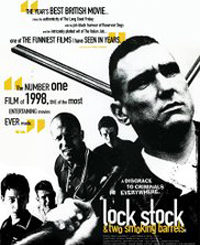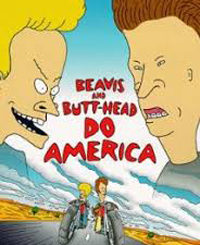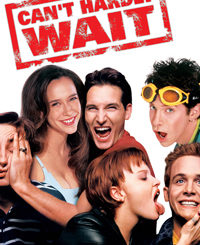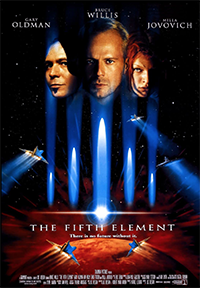 The Fifth Element
The Fifth Element
with Bruce Willis, Milla Jovovich, Gary Oldman
Written by Luc Besson and Robert Mark Kamen
Directed by Luc Besson (Columbia Pictures)
by Adam Haynes
The majority of film reviewers don’t know shit.
Who can blame them? After all, most still subscribe to that long-dead notion of the film auteur. To make matters even more absurd, when an actual auteur does come along – and there have always been a few around (Truffaut wasn’t completely wrong, only mostly), these proud and fine gatekeepers between pop art and cultural sensitivity have positively no idea what to do.
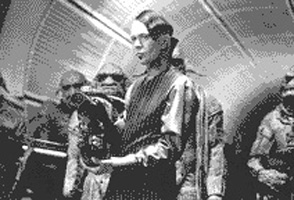 Case in point is auteur extraordinare Luc Besson. From the beginning, he proved himself to be quite a nuisance. He came onto to the scene with The Final Combat (’84), a futurist tragedy about loneliness and desperation in black and white with basically only four characters (the last people on Earth) and no dialogue whatsoever. Stumped, most critics called it an art film and pegged Besson as an art director. Most were therefore baffled by his next effort, Subway (’85), which was very commercial, but at the same time, refused to be put into any kind of category. How could someone make a commercial film and put in so many non-commercial themes so…effortlessly? Playing it safe, the establishment said here was a kid with potential if he would only try harder to provide some sort of plot, and cut out the goofiness. As if in response, Besson’s next film,The Big Blue, was almost pure non-plot and absolute goofiness. While it was being panned, no one bothered to realize that Besson was pioneering a singular cinematic form where plot and conventional stiffness were becoming less and less necessary. La Femme Nikita (’91) was undeniable in its greatness, which made The Professional (’95) even more puzzling. His themes were bold without being pretentious. He so easily executed genre moves while at the same time…effortlessly… combining them with goofiness. And still somehow the material wasn’t cheapened. Critics can’t write about that – why they’d have to put down their press packets!
Case in point is auteur extraordinare Luc Besson. From the beginning, he proved himself to be quite a nuisance. He came onto to the scene with The Final Combat (’84), a futurist tragedy about loneliness and desperation in black and white with basically only four characters (the last people on Earth) and no dialogue whatsoever. Stumped, most critics called it an art film and pegged Besson as an art director. Most were therefore baffled by his next effort, Subway (’85), which was very commercial, but at the same time, refused to be put into any kind of category. How could someone make a commercial film and put in so many non-commercial themes so…effortlessly? Playing it safe, the establishment said here was a kid with potential if he would only try harder to provide some sort of plot, and cut out the goofiness. As if in response, Besson’s next film,The Big Blue, was almost pure non-plot and absolute goofiness. While it was being panned, no one bothered to realize that Besson was pioneering a singular cinematic form where plot and conventional stiffness were becoming less and less necessary. La Femme Nikita (’91) was undeniable in its greatness, which made The Professional (’95) even more puzzling. His themes were bold without being pretentious. He so easily executed genre moves while at the same time…effortlessly… combining them with goofiness. And still somehow the material wasn’t cheapened. Critics can’t write about that – why they’d have to put down their press packets!
Besson’s latest, The Fifth Element, will continue to confuse the rest of the sheep, though they never will admit it. Like any summer blockbuster, critics will polarize themselves for or against it, but regardless of their wetting or not wetting their pants, if the film makes a zillion dollars it won’t matter what the critics say and Besson will finally be accepted (not that he gives a flying French fuck, I’m sure).
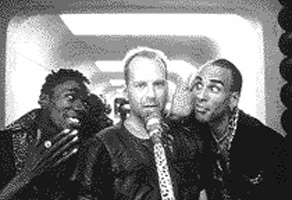 Never one to avoid or deny the value of mainstream gimmicks, Besson has loaded this one to the hilt, supplying the three ingredients essential for potential popularity, namely: grand science fiction, Bruce Willis in a tank top, and huge intergalactic explosions. The trick to the zillion dollar question will be in whether audiences are so engrossed in all of these Big Three that they either ignore or accept all the widely bizarre, exciting, and goofy elements Besson has pasted on as well.
Never one to avoid or deny the value of mainstream gimmicks, Besson has loaded this one to the hilt, supplying the three ingredients essential for potential popularity, namely: grand science fiction, Bruce Willis in a tank top, and huge intergalactic explosions. The trick to the zillion dollar question will be in whether audiences are so engrossed in all of these Big Three that they either ignore or accept all the widely bizarre, exciting, and goofy elements Besson has pasted on as well.
What is this film about? Pure science fiction, baby – it is as much a libidinous history of science fiction film as it is science fiction itself. That is because Besson knows that no ideas are original, so instead of blandly imitating what has come before (see all films connected with Roland Emmerich) he has great fun aping the entire genre (watch for Princess Leia hair and Chris Tucker as a revisionist Chewbacca) which is not to say making fun of it or putting it down. Look-wise, the film resembles Brazil (’84) and Flash Gordon (’80) – both of which are summations of the two strands the genre has taken (dystopia and space opera). Plotwise, Bruce Willis helps Milla Jovavich save the universe – big surprise, right? Somehow all this intertextual camp (which exists in gooey quantities through out the film), never dominates the material. This is the Besson touch, and it might just save the genre from itself (if anyone pays attention). What is this trick? Well thought out and sympathetic characters – especially the women, women are always the anchor to his stories and their themes.
Like all of the Besson leading ladies before her (Natalie Portman, Anne Parillaud, etc.), it is Milla Jovavich (I guess she’s using her last name again now that she isn’t trying to be a pop music star) who is the gestalt which makes this story breath with orgasmic spontaneity. With practically no dialogue, she is still so utterly convincing, you never for a second doubt that she isn’t the supreme being of all the universe (the fifth element). Watching her up there on the big screen, half-naked, with hair the color of rosy napalm, karate-chopping alien goons – all the while with a vulnerability so raw and intense it makes you feel real… Holy shit, I want more, I want more.
Bruce Willis might not be the John Wayne of my generation (Kurt Russell was before he fucked it all up with Escape from LA) but I’ve always considered him a first-rate actor, and it’s fitting that he should end up in a Besson film, seeing as how they are both utterly underrated and ill-treated by the general critical establishment. Once again he gives an excellent performance (the most important aspect of being a male action star is comic timing, which our boy has in spades), never overshadowing Jovavich and displaying the tenderness and understanding so important in Besson leading men (notably Jean Reno, who Willis almost looks like).
I’m not sure if Gary Oldman under- or over-plays the Villain, a cross between Ming the Merciless, Adolf Hitler, and Jimmy Dean (the sausage king) stuck in Andy Warhol’s body. When he was blown up, I still wasn’t sure.
What really makes this film a triumph is that it shows Besson finally reconciling the basic thematic tragedy which has been the underlying structure to all his stories thus far. From The Final Combat forward, all of his films, in one form or another, have been about superior exalted women and the kind-hearted men who can never have them. In The Fifth Element, he finally allows the guy to get the girl. The fact that he has gone back to science fiction – where he started with The Final Combat – shows he has at last come full circle. And it is a joyful conclusion. Not that any of my peers will notice.

